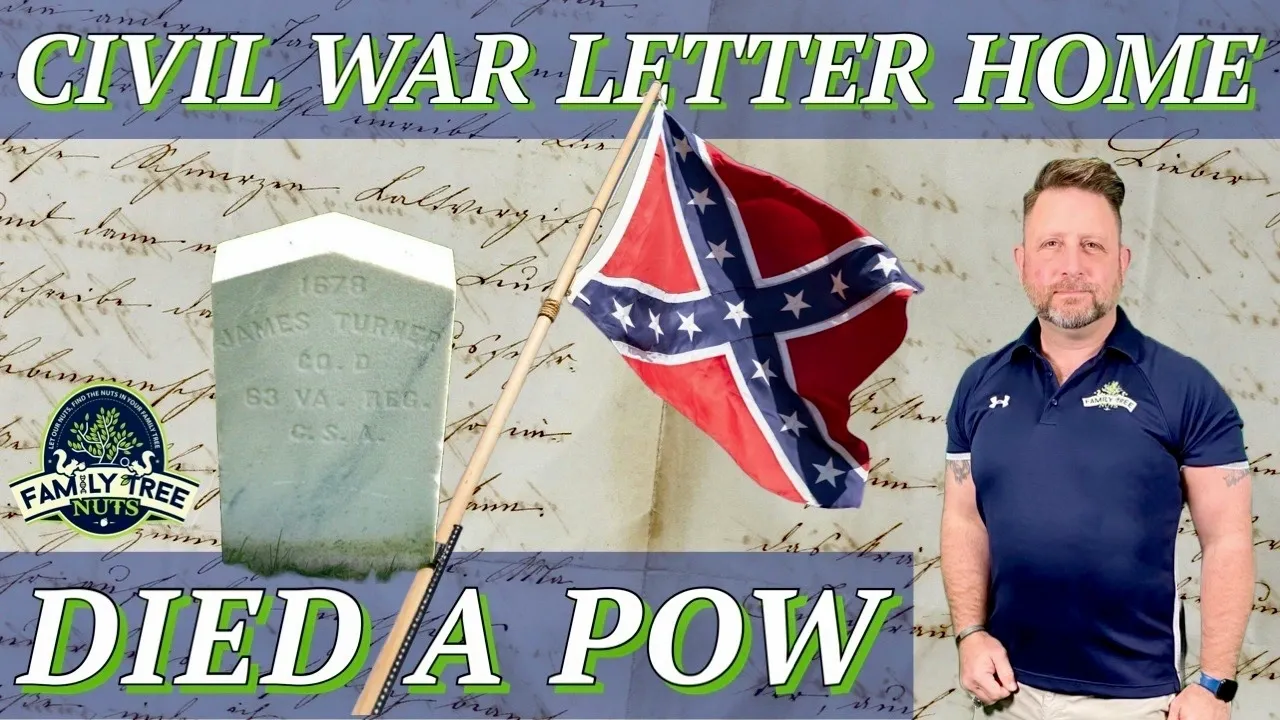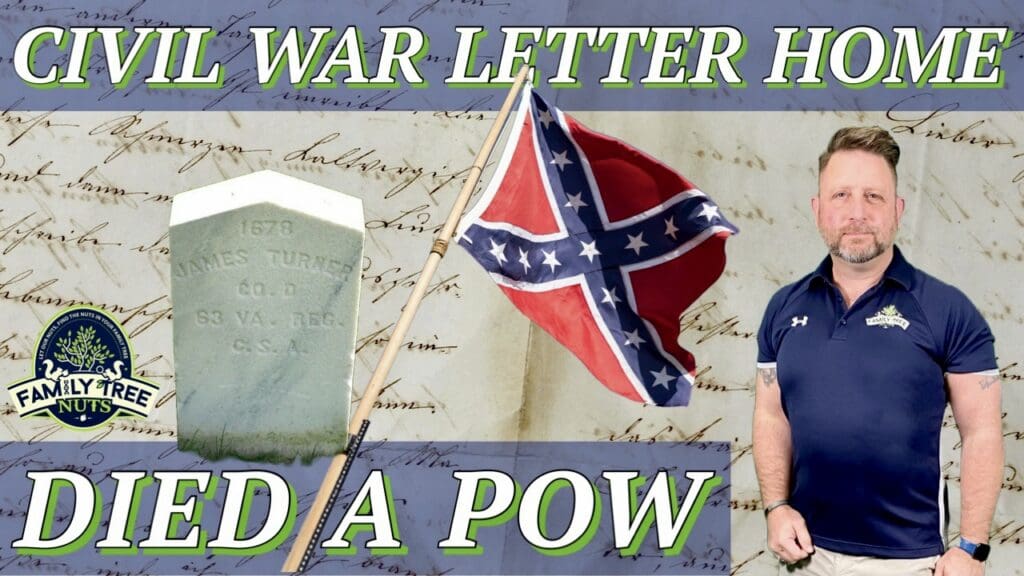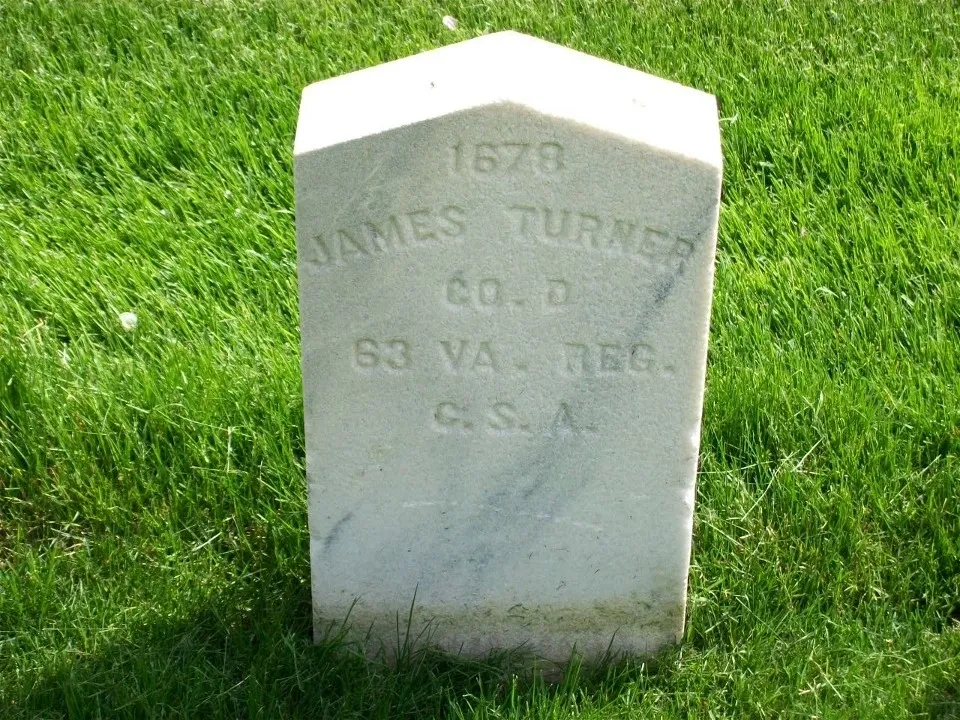
CIVIL WAR LETTER HOME! DIED A POW! HISTORY!

He served in the Confederate Army where he saw a ton of action. He wrote letters home, one of which we discovered and are about to share with you. He spent almost a year as a POW in horrible conditions and sadly passed away just weeks before men were released. This is the story of Private James Turner.
While working on a family tree for a client, I came across the amazing story of his 3rd-great-grandfather. The more that I discovered about him, the more that I knew that I wanted to share his story with all of you. Now on to our story. James Turner was born on 18 January 1831 in Montgomery County, Virginia. By 1850, he worked at a mill which was located next to the Bishop family, and his future wife Sarah, whom he married in 1852. By 1860, he was a farmer and had four children.
James enlisted for three years in the Confederate Army, on 15 April 1862, in Peterstown, Monroe County, Virginia, which became West Virginia the following year. His unit was Company D, 63rd Virginia Infantry and he was paid a $50 bounty for joining. A few month later, he was present with his unit when they took part in the Battle of Charleston, now West Virginia, on 13 September 1862. By February he was dug in with his unit in Southampton County, Virginia, and he took the time to write a letter to his wife. Many years later that letter was found in the papers of James’ daughter by his 3rd Great-Granddaughter Ms. N.J. Netter. Ms. Netter transcribed the letter and wishes to be cited as the source. She shared it online for all future descendants to cherish and now I’m lucky to share it with you. Like many of our own writings, some grammar of the letter isn’t perfect but we have chosen to share it how it was written.
Franklin Station
Southampton County, Va.
February 19, 1863
Dear Wife,
I again seat myself to address you with a few imperfect and bad composed lines, for a soldier has a bad chance to compose a good letter whilst in the Army, our minds confused and tore to pieces that we can’t write but very well. I have a very bad arm where I was vaccinated. I think that I caught cold yesterday in the rain and I have not felt very well since. Sarah, I hope when this reaches you it may find you as I haven’t heard from you since I left home. I have written two letters before this and sent them to you without getting an answer. I sent one by McConnell, the other by mail.
I will give you the state of affairs down here. Times is hard, we get scanty rations and more than that we have so much duty, hard duty, to do, picket duty and drilling. Also, we are throwing up breastworks. We commenced yesterday, worked all day in the rain. They are at it today. I was excused today and I am in camp. My arm hurt me so that I could not work.
We expect to fight every day or very soon. The enemy, it’s reported, have reinforced with thirty thousand which makes in all forty thousand. We have but a small force here. I think there ain’t more than ten thousand here at this time but we are getting reinforcements every day. It is very wet here now and has been for several days, haven’t had but one snow since we come down to camp. Lieutenant Squer got back on the 18th. I wish I had stayed till he came which I could have done if it had not been for McConnell. He wanted to get his substitute in so bad that he couldn’t stay any longer so I came with him.
Sarah, I had the luck to draw one pair of pants and one pair drawers and one shirt. This is all the clothes that I have drawn yet. So I believe I have given you all the news I have present. Sarah, I reckon you have gotten the loom out of the place by this time. Tell Asa howdy for me. Tell him to dry up and go in his hole and keep out of the way of the cavalry. Give my love and respects to all inquiring friends.
Your well-wisher and husband,
James Turner
P. S. Farewell, Write soon.
May God bless you forever and keep my little
children from all evil.
Wow, how powerful is that? We often read about units, commanders, and battles, and we gloss over the conditions. Letters like these give us an amazing snap shot of what the individual soldier experienced and I for one think that they are extremely valuable, especially to their descendants.
James’ story was far from over when he wrote this letter. He continued the fight and was present for The Battle of Chickamauga, where his unit fought with famous Generals Bragg, Longstreet, Hood, and Breckenridge. He also was at the Battle of Chattanooga on 23 and 24 November 1863. Then they were in the Battle of Missionary Ridge on 25 November 1863, where he fought against famous Union Generals Grant and Sherman.
His last battle was on 27 November 1863 when he was taken prisoner at the Battle of Ringgold Gap, in Ringgold, Georgia. Casualties were low for this battle with only 20 Confederates killed and 201 wounded, but somehow he was captured.
On 8 December 1863, he was sent from Chattanooga, Tennessee, to the 2nd United States Army Hospital in Nashville, Tennessee, for chronic diarrhea. On 27 January 1864 he was sent to Louisville, Kentucky and slotted for a prisoner exchange. He arrived in Louisville on 28 January 1864.

For some reason he was not exchanged, and on 29 January he was discharged from Louisville, and sent to the prison in Rock Island, Illinois. He was enrolled at Rock Island on 1 February 1864. Rock Island is sometimes called, “The Andersonville of the North” due to its brutal conditions. The winter that year saw temperatures as low as 32 degrees below zero. Over 12,400 men were once imprisoned as Rock Island, of which 1,964 died. The conditions were so bad that even 171 of the Union guards died.
James spent almost an entire year as a prisoner of war at Rock Island and we can only imagine the horrors that he witnessed. History tells us that conditions at the prison became much worse by the end of 1864. James sadly passed away of consumption on 16 December 1864. He was buried in Rock Island Confederate Cemetery in grave #1678. Just a few weeks later over 3,000 of the prisoners were exchanged or released. James was only thirty-three years old and left behind a wife and four children.
Wow, now we know the story of Private James Turner. What are your thoughts? Were you moved by his story? How would it affect you if you discovered a story like this about one of your ancestors? I’d love to hear what you have to say in the comments below.
When we discover stories about our ancestors, especially like this one, history becomes tremendously more real. The battles that we read about or drive by, begin to have a different impact on us and we are bestowed with a deeper enlightened understanding. Discovering and preserving stories like this is a passion of ours and we are so proud to be able honor Private James Turner by discovering him and sharing his story with his descendants, and all of you. Be sure to see our video below about this story.
-Col. Russ Carson, Jr., Founder, Family Tree Nuts
